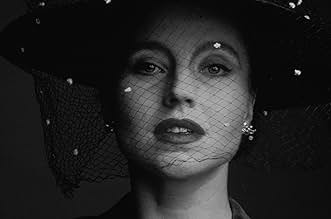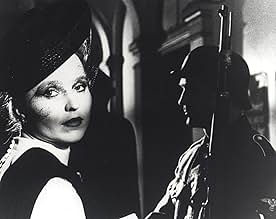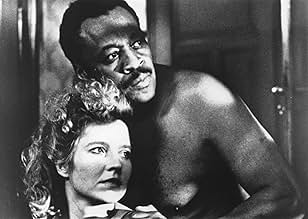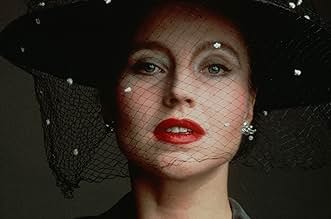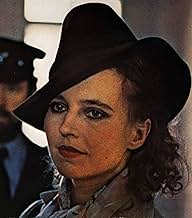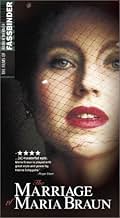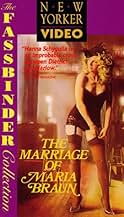Mary se casa com Hermann Braun nos últimos dias da Segunda Guerra Mundial, apenas para que ele desapareça na guerra. Maria, sozinha, usa sua beleza e ambição para encontrar prosperidade dura... Ler tudoMary se casa com Hermann Braun nos últimos dias da Segunda Guerra Mundial, apenas para que ele desapareça na guerra. Maria, sozinha, usa sua beleza e ambição para encontrar prosperidade durante o milagre econômico da Alemanha dos anos 50.Mary se casa com Hermann Braun nos últimos dias da Segunda Guerra Mundial, apenas para que ele desapareça na guerra. Maria, sozinha, usa sua beleza e ambição para encontrar prosperidade durante o milagre econômico da Alemanha dos anos 50.
- Direção
- Roteiristas
- Artistas
- Prêmios
- 13 vitórias e 7 indicações no total
- Bill
- (as George Byrd)
- Hans Wetzel
- (as Günther Lamprecht)
Avaliações em destaque
Trouble arises, as happens in Rainer Werner Fassbinder's melodramas, and as its one of his best and most provocative, we see as Maria (uncommonly gorgeous Hanna Schygulla in this role) will do a two-face: she'll stand by her man, even if it means working at a bar for American GI's and, even still after she hears from a fellow soldier that Hermann has died will still stand by him as she sleeps with a black GI and comes close to bearing his child (that is, naturally, until he reappears and a murder occurs and he takes the rap so she can be safe), or working for a German businessman (effectively sympathetic Ivan Desny) and becoming his sometimes mistress and rising star in the company. Maria will do whatever it takes to be successful, but she'll always be married.
It's hard to say there's anything about Maria that isn't fascinating. Money, sex, power, all of these become interchangeable for Maria. She's like the feminist that has her cake and eats it with a sultry smile: she gets to have a husband, more or less (actually a lot less until the last ten minutes of the film) while obtaining things- a man who dotes on her whenever he can, a new and expensive house with servants, a secretary, money- that others around her aren't getting due to already being with a man or too weak in a position to rise anywhere (such as the secretary, played interestingly enough by Fassbinder's own mother).
Maria is sexy, confident, and all alone, with an idealized life going against a life that should be made in the shade. She says of the two men- the American soldier and poor old and sick Oswald- that she's fond of them, and at the same time will stick by those roses the confused and soul-searching husband Hermann sends from Canada, after being released from prison. She's casts a profile that a feminist would love to trounce, but understand where she's coming from and going all the way.
Fassbinder employs this inherent contradiction, and moments with Maria appear to go against the conventions of a melodrama (for example, Hermann walking in on the jubilant and half-naked Maria and GI is just about a masterpiece of a scene, with Maria's reaction not of surprise or guilt but pure happiness to see that he's there let alone alive), while sticking to his guns as a director of such high-minded technique with a storyline that should be predictable. But it isn't really. It's like one big metaphor for a country that, after the war, couldn't really move on to normalcy. A few times Fassbinder puts sound of the radio on in the background, and we see Maria walking around her family house, hustle and bustle going on around her, and the radio speaks of a divided Germany, of things still very unsettled, of a disarray. Maybe the only way to cope is excess, or maybe that's just my interpretation of it.
It's hard to tell, really, under Schygulla's stare face and eyes, anyway. It's such an incredible performance, really, one of those showstoppers that captures the glamor and allure of an old-time Hollywood female star while with the down-and-dirty ethic of a girl of the streets. Most telling are the opposing costumes one sees in one scene when she finally is with her husband, where she stars in one of those super-lustful black lingerie pieces and high heels, and then moves on to a dress without even thinking about it. That's almost the essence of what Maria is, and Schygulla wonderfully gets it down, a headstrong but somehow loving figure who is adored and perplexed by the men around her, sometimes in a single sentence. This is what Fassbinder captures in his wonderful first part of his "trilogy"; while I might overall prefer Veronika Voss as a masterpiece, Maria Braun is perhaps just as good as a character study, of what makes a woman tick and tock with (almost) nothing to lose.
The Marriage of Maria Braun is a film that operates on two different levels. On the one hand in can be seen as a look at one woman's struggle against adversity in the hardships of the post war years. While on another, the film can clearly be read as a critique of the way the new Germany forgot it's awful past and sold it's soul in order to prosper in what would become known as the German Economic Miracle. This latter reading can be determined by reading the main narrative as an allegory in which Maria Braun represents the new Germany. She begins by prostituting herself to the Americans and ends very wealthy but emotionally dead; she forgets her past quickly in order to concentrate on her future.
There is no doubt that Rainer Werner Fassbinder put together a clever allegorical film here. And there is also no doubt that Hanna Schygula is very good in the lead role. But I did have difficulty with empathising with the people in this story, as none of them were particularly likable. Perhaps that was the point of course. But, whatever the case, the film left me cold unfortunately.
In the rubble of the Second World War, Maria/Germany survives, between a tenuous hope of returning to the lost past and the agony of a miserable and dishonorable present.
But the defeated have no right to shame. It is up to them to rebuild the future in the bed of the victors, until they learn to live without them, more than autonomously, as new victorious powers, taking the place of those who humiliated them. In life, in the economy or even in football (Fassbinder coincides the narrative climax with the 1952 World Cup final, in which Germany became champion, for the first time in the history of the competition, thus using yet another metaphor for German reconstruction).
After the victory is complete, the honor is washed away, life ends and it is time to give way to others, to the future, which must not repeat the mistakes of the past.
A bold message and a powerful performance by Hanna Schygullla.
Fassbinder at his best.
This is a Modern Classic, one of the very best films to come out of the 1970s/80s German Cinema. Much stronger than "Veronica Foss" and in the league of "Das Boot", "The Marriage of Maria Braun" is a product of Modern German Dramatic Cinema's golden age. No sugar coating, just pure, unadulterated truth as seen through the rear-view mirror of people who have lived the horrors and survived into new tomorrows. A true gem of a film!
Você sabia?
- CuriosidadesInspired by "Mutter Courage und ihre Kinder" (1938/39), a play by Bertolt Brecht, and Serpente de Luxo (1933).
- Erros de gravaçãoAt the end of the cut of the two kids blowing up the firecrackers, they start laughing but no sound is heard. The sound of laughter is heard on the next cut after they get yelled at by the man scavenging for wood.
- Citações
Maria Braun: I'm a master of deceit: a capitalist tool by day, and by night an agent of the proletarian masses - the Mata Hari of the Economic Miracle.
- Cenas durante ou pós-créditosAt the very end of the credits the following persons are 'credited' by their picture: Konrad Adenauer, Ludwig Erhard, Kurt Georg Kiesinger and Helmut Schmidt and a disconnected phone line can be heard.
- Trilhas sonorasIn The Mood
Written by Wingy Manone, Andy Razaf and Joe Garland
Principais escolhas
- How long is The Marriage of Maria Braun?Fornecido pela Alexa
Detalhes
- Data de lançamento
- País de origem
- Centrais de atendimento oficiais
- Idiomas
- Também conhecido como
- The Marriage of Maria Braun
- Locações de filme
- Empresas de produção
- Consulte mais créditos da empresa na IMDbPro
Bilheteria
- Orçamento
- DEM 1.975.000 (estimativa)
- Faturamento bruto nos EUA e Canadá
- US$ 8.144
- Fim de semana de estreia nos EUA e Canadá
- US$ 11.623
- 16 de fev. de 2003
- Faturamento bruto mundial
- US$ 11.869


